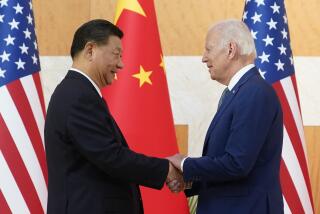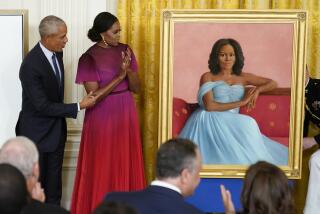Barbara Bush Revels in Visit to Place She Calls ‘2nd Home’
- Share via
BEIJING — Today was a day for culture and reminiscing for First Lady Barbara Bush, who said her “only regret” was that it would be considered improper for a First Lady to take off down a street on a bicycle, as she used to do when the Bushes lived here in the mid-1970s.
Despite that restriction, Mrs. Bush said her seventh trip to China is “a very exciting visit. I feel like we’ve come to our second home.”
From the morning service at the Chong Wen Men Christian Church, the First Lady left her husband and set out for tea at a restored Qing Dynasty residence and later, a tour of the Forbidden City.
She had tea and pastries and watched Chinese dancing with more than 30 Chinese women at Prince Gong Wang Fu’s mansion. The prince was the great uncle of Pu Yi, China’s last emperor.
It is said that when Pu was a very young child--he became emperor at age 3 in 1909--he visited his uncle at the mansion where the tea was held. In a chilly theater room with bare concrete floors and elaborately hand-painted walls and ceilings, Barbara Bush was led by a costumed dancer to sit at each of the 11 tables for about three minutes to chat with the visitors, who included diplomatic spouses and women in Chinese government, culture and education.
The atmosphere was relaxed, and at one point Xie Rongjin, a magazine editor who served as Charlton Heston’s interpreter when Heston directed a production of “The Caine Mutiny” here last year, came up and got the First Lady’s autograph on her luncheon program.
A band playing Chinese instruments performed traditional music but enlivened the proceedings toward the end by playing a rousing “Yankee Doodle,” with the audience clapping along.
The tea was hosted by Bette Bao Lord, author of “Spring Moon,” who is the wife of the U.S. ambassador Winston Lord.
The visit was seen as significant because the mansion and its grounds were only recently opened to the public. The late Premier Chou En-lai is said to have insisted that the estate, which had been Beijing’s grandest private garden and residence during the Qing dynasty, be left intact for future restoration. About one-third of the compound has been restored at a cost of 6 million yuan ($1.6 million).
More to Read
The biggest entertainment stories
Get our big stories about Hollywood, film, television, music, arts, culture and more right in your inbox as soon as they publish.
You may occasionally receive promotional content from the Los Angeles Times.










